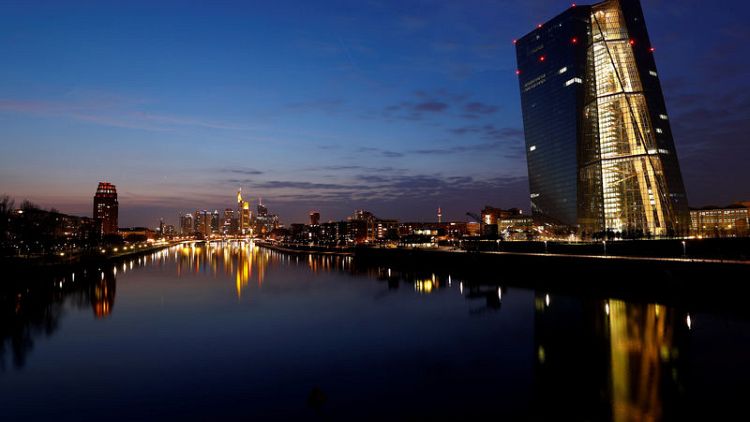By Shrutee Sarkar
BENGALURU (Reuters) - The European Central Bank is expected to wait until the fourth quarter to raise its deposit rate, later than thought just a month ago, according to economists in a Reuters poll, who also said the chances of a euro zone recession have grown.
Reuters polls since June 2018 have predicted that after ending its asset-purchase programme in December, the ECB would follow with a rate rise in the third quarter of 2019, in line with the ECB's guidance.
But a barrage of weak data - including news that Europe's top economy, Germany, barely skirted a recession in the second half of last year - suggests growth has slowed, persuading economists to push forward that long-held forecast.
They also slashed their growth outlook for Germany, France and Italy compared with an October poll.
"While an outright recession will probably be avoided this year, a sharper-than-expected slowdown in the U.S. or further escalation of the (U.S.-China) trade war may be enough to cause a mild recession," said Andrew Kenningham, chief euro zone economist at Capital Economics.
The ECB is now expected to raise its deposit rate, currently at -0.40 percent, to -0.20 percent in the fourth quarter and wait until early 2020 to raise its refinancing rate from zero to 0.20 percent.
The latest Reuters poll comes at a time of tightening financial conditions and with Britain's scheduled exit from the European Union imminent but no agreement within the UK government on how to proceed.
"Brexit, for the euro zone, is also an important risk -- it might cause disruption in exports to the UK and that's an additional factor that might weigh on growth," said Peter Vanden Houte, chief euro zone economist at ING.
Only two respondents forecast the economy would shrink in 2020, but the median probability of recession in the next two years rose to 35 percent from 30 percent in December. That is the highest since Reuters started asking the question in July, and the second straight month it has risen.
More than a third of economists polled gave a 40 percent chance or more of a recession. And on a like-for-like basis, out of 36 common contributors in January and December, nearly two-thirds raised their two-year recession probability. Ten kept it at the same level. Only three lowered it.
The chance of a recession this year also rose to 25 percent from 20 percent in December.
Reuters Poll: Euro zone recession probability : https://tmsnrt.rs/2AQLG6h
But plenty remain unconvinced.
"You need certain preconditions for an economy to fall into a recession and I do not see them as of yet," said Elwin de Groot, head of macro strategy at Rabobank.
"Clearly there are some downside risks to the outlook, but we also acknowledge that when we look back over the past couple of quarters at least part of that weakness that we've seen in the data is still probably of a transitory nature."
ECB President Mario Draghi said on Tuesday the euro zone was not heading for a recession but needed support from the central bank as the slowdown could last longer than expected.
The ECB ended its more than 2.6 trillion-euro ($3.0 trillion) bond-buying programme last month but kept the door open for more if required. All 70 economists who answered an extra question said it would not restart purchases this year.
POLICY QUANDARY?
Most economists now agree that global growth, as well as U.S. growth, has peaked. Consequently, a dilemma may soon present itself.
"We think the ECB will miss out on this global tightening cycle completely. GDP growth slowed abruptly in late 2018 and will probably be below trend this year and next," said Capital Economics' Kenningham.
"As a result, core inflation will remain a long way below target and the hawks on the Governing Council will not win the argument in favour of policy tightening."
Asked how confident economists were the ECB would be able to raise rates before the next downturn, only 36 of 65 said yes.
Reuters Poll: ECB hikes before the next downturn? : https://tmsnrt.rs/2Hj71ed
The latest Reuters poll suggests inflation, which the ECB targets at just below 2 percent, will average 1.6 percent this year and next, similar to last month's poll.
Growth will average 0.4 percent in each quarter through to the middle of next year, according to median forecasts in the Jan. 9-17 survey of over 90 economists.
Forecasts for 2019 full-year average growth were trimmed to 1.5 percent, the lowest in over a year of polling for that period, and below the ECB staff's 1.7 percent projection. The 2020 forecast was 1.5 percent.
(Additional reporting by Vivek Mishra,; Polling by Tushar Goenka and Nagamani Lingappa; Editing by Ross Finley and)



